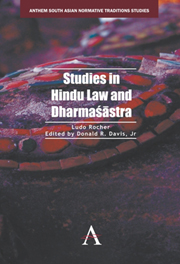Book contents
- Frontmatter
- Contents
- Foreword by Richard W. Lariviere
- Preface
- Abbreviations
- Note on the Edition
- Introduction
- PART ONE THE NATURE OF HINDU LAW
- PART TWO GENERAL TOPICS OF HINDU LAW
- PART THREE HINDU LEGAL PROCEDURE
- PART FOUR TECHNICAL STUDIES OF HINDU LAW
- PART FIVE ANGLO-HINDU AND CUSTOMARY LAW
- Indian Response to Anglo-Hindu Law
- Can a Murderer Inherit his Victim's Estate? British Responses to Troublesome Questions in Hindu Law
- Reinterpreting Texts: When Revealed Sanskrit Texts Become Modern Law Books
- Father Bouchet's Letter on the Administration of Hindu Law
- Jacob Mossel's Treatise on the Customary Laws of the Veḷḷāla Cheṭṭiyārs
- Bibliography
- Index
Indian Response to Anglo-Hindu Law
from PART FIVE - ANGLO-HINDU AND CUSTOMARY LAW
Published online by Cambridge University Press: 05 February 2013
- Frontmatter
- Contents
- Foreword by Richard W. Lariviere
- Preface
- Abbreviations
- Note on the Edition
- Introduction
- PART ONE THE NATURE OF HINDU LAW
- PART TWO GENERAL TOPICS OF HINDU LAW
- PART THREE HINDU LEGAL PROCEDURE
- PART FOUR TECHNICAL STUDIES OF HINDU LAW
- PART FIVE ANGLO-HINDU AND CUSTOMARY LAW
- Indian Response to Anglo-Hindu Law
- Can a Murderer Inherit his Victim's Estate? British Responses to Troublesome Questions in Hindu Law
- Reinterpreting Texts: When Revealed Sanskrit Texts Become Modern Law Books
- Father Bouchet's Letter on the Administration of Hindu Law
- Jacob Mossel's Treatise on the Customary Laws of the Veḷḷāla Cheṭṭiyārs
- Bibliography
- Index
Summary
Any discussion of Hindu law in the 19th and 20th centuries has first to refer to the often quoted paragraph from the plan which the Committee of Circuit, with Warren Hastings as its president, drew up on August 15, 1772, and which was adopted by the President and Council at Fort William on August 21 of the same year:
That in all Suits regarding Inheritance, Marriage, Caste and other religious Usages or Institutions, the Laws of Koran with respect to Mahometans and those of the Shaster with respect to Gentoos shall be invariably adhered to (Forrest, ed. 1910: 295–6).
We might be tempted, two hundred years after these words were written, to consider the decision of the Committee of Circuit as the sole possible and normal course of action. In reality, “the decision was far-sighted policy —not a matter of course” (Rankin 1946: 4), and it was adopted against considerable opposition.
There is no doubt that some of the early British magistrates, who were eager to implement the decision of the Committee, were motivated by highly humanitarian principles.
- Type
- Chapter
- Information
- Studies in Hindu Law and Dharmasastra , pp. 633 - 642Publisher: Anthem PressPrint publication year: 2012

